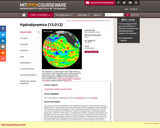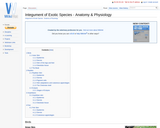Fish, Fishing, and Conservation is a 389-page, peer-reviewed open textbook intended for undergraduate students who are exploring majors in Fish & Wildlife. It is also relevant to a general audience or for use in courses which explore social and ethical aspects of fish, fishing and conservation.
Are you reviewing or adopting this book for a course?
Please help us understand your use by completing this form https://bit.ly/fishandconservation_interest
People, places, and approaches to fishing are as varied as the diverse fish fauna that exist on the planet. As conservation planners recognize the value of substantial engagement of stakeholders in decision making and ineffectiveness of rigid top-down management approaches, Fish, Fishing, and Conservation asserts that all peoples must play a role in conservation. Through case studies, engaging narrative and graphics, and exercises, the text explores major motivations for fishing and non-fishing related values, responsible fisheries practices, the rights of all people to decide how to manage and conserve fish, their habitats, and how they are utilized in the context of overfishing as a pressing global problem for which appropriate solutions are not easily found nor implemented.
Introductory chapters examine fish, fishing, and why fish matter and examine the role of values in driving conservation initiatives. Fish and their unique sensory capabilities are described along with a review of recent studies to examine issues of pain, sentience, and learning in fishes living in a foreign, underwater world. The text incorporates these new findings in conservation and management leading readers to evaluate and adopt suitable approaches to ethical reasoning which consider the welfare needs of wild and cultured fishes. Later chapters focus on the role of gender in fishing, conservation organizations, recreational fishing, and a focus on specific fisheries that reveal the principles of conservation and management as they play out in major controversies. Additionally, the textbook contains audio recordings of professional profiles by Virginia Tech students. These are linked at the beginning of each end-of-chapter Professional Profile. Audio recordings are also available on Spotify.
How to Access the Book
The main landing page for this book is https://doi.org/10.21061/fishandconservation. The text is available in multiple formats, including PDF, ePub, and Pressbooks https://pressbooks.lib.vt.edu/fishandconservation.
Teaching Resources
Additional teaching resources including a sample syllabus, course schedule, and selected assignments related to this book are available at http://hdl.handle.net/10919/115425. Individuals who wish to share their materials relevant to teaching in this subject area are encouraged to join and share their openly-licensed resources via the Fish, Fishing, and Conservation Instructor Group in OERCommons
ISBN
ISBN PDF 978-1-957213-27-9
ISBN Print 978-1-957213-28-6
ISBN Pressbooks 978-1-957213-31-6 https://pressbooks.lib.vt.edu/fishandconservation
ISBN ePub 978-1-957213-29-3
Table of Contents
1. Fish, Fishing, and Why They Matter
2. Values Drive Fish Conservation
3. Sensory Capabilities of Fish
4. Ethical Reasoning and Conservation Planning
5. Pain, Sentience, and Animal Welfare
6. Public Aquariums and Their Role in Education, Science, and Conservation
7. Gender and Fishing
8. Angling and Conservation of Living Fishy Dinosaurs
9. Fly Fishing’s Legacy for Conservation
10. Recreational Fishing and Keep Fish Wet
11. Integrating Fishers in the Management of Arapaima
12. Conserving Tunas: The Most Commercially Valuable Fish on Earth
13. Groupers and Spawning Aggregations
14. Menhaden and Forage Fish Management
15. Takeaways for Successful Fish Conservation
Suggested Citation: Orth, Donald (2023). Fish, Fishing, and Conservation. Blacksburg: Virginia Tech Department of Fish and Wildlife Conservation. https://doi.org/10.21061/fishandconservation. Licensed with CC BY 4.0.
About the Author
Donald J. Orth is the Thomas H. Jones Professor in the Department of Fish and Wildlife Conservation at Virginia Polytechnic Institute and State University. He has taught the following courses: Ichthyology, Stream Habitat Management, Fisheries Management, Fish Population Dynamics, Fish, Fishing, and Conservation, and First-Year Experience in Natural Resources. His principal interests are in population and community ecology, stream fish ecology, regulated rivers, instream flow and stream habitat assessment, fisheries management, and fish population dynamics. He has guided numerous undergraduate research projects and advised 33 graduate students during his career.
Don attended Eastern Illinois University (BS) and Oklahoma State University (MS and PhD). He is a Life Member of the American Fisheries Society and a Certified Fisheries Professional. He is also a Fellow of the American Fisheries Society, the American Institute of Fisheries Research Biologists, and the Virginia Natural Resources Leadership Institute. Don has published more than 150 primary papers and 50 technical reports on fish, fisheries, and riverine management. Much of his research was also communicated with a general audience in over 180 popular articles. He has received numerous awards for his teaching and contributions to conservation and public outreach. Most recently, the Virginia Chapter of the American Fisheries Society awarded him the Eugene W. Surber Award for years of significant contributions to the field of fisheries science.
Selected Acknowledgments
Publication of this work was made possible in part by grants from VIVA, the Virtual Library of Virginia, and the University Libraries at Virginia Tech through its Open Education Initiative, which provides development assistance and financial support to Virginia Tech faculty who wish to use, create, or adapt openly licensed teaching materials to support student learning. The University Libraries also contributed faculty and staff support. Donald Orth’s contributions were supported in part by the U.S. Department of Agriculture through the National Institute of Food and Agriculture Program and Virginia Tech Polytechnic Institute and State University. Additional funding support was provided by the Thomas H. Jones Endowment.
Errata and Error Reporting
Errata
Error Reporting
Accessibility Statement: Virginia Tech is committed to making its publications accessible in accordance with the Americans with Disabilities Act of 1990. The Open Education Initiative is committed to continuous improvement regarding accessibility. The text, images, and links in the PDF versions of this text are tagged structurally and include alternative text, which allows for machine readability. Audio recordings of each profile in fish conservation are available as mp3 files via Spotify and Pressbooks. Please contact openeducation at vt.edu if you are a person with a disability and have suggestions to make this book more accessible.
Cover Art: Nora Ligus
Cover Design: Kindred Grey






